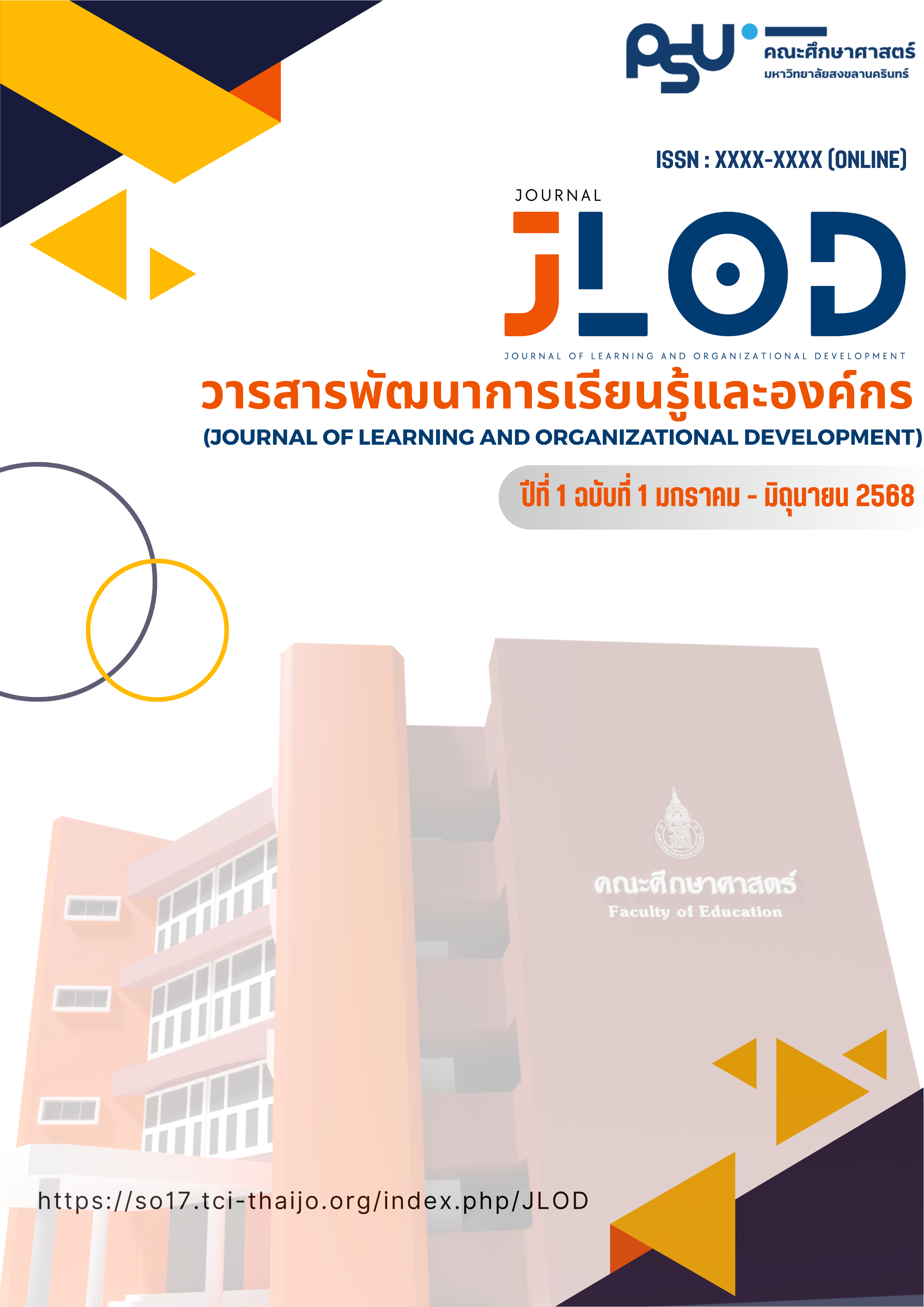Development of Executive Function in Elementary School Students in Demonstration School of Kasetsart University Multilingual Education Program Center for Educational Research and Development Using a Multiple Intelligences Approaches
Keywords:
Executive Function, Executive Function, multiple intelligences concept, early elementary school students, Early Elementary School StudentsAbstract
Developing learners aged 0-7 years to have the potential and ability to sustainably adapt in the 21st century world requires developing fundamental Executive Function as the basis for life that can support further academic learning and living. This study therefore aimed to evaluate the effectiveness of activities promoting Executive Function in early elementary school students in Demonstration School of Kasetsart University Multilingual Education Program Center for Educational Research and Development using the multiple intelligences concept developed in a sample randomly selected of 92 people form 120 people who enrolled in activities to develop thinking skills with Executive Function of the academic year 2023. The research instruments were activities promoting Executive Function in early elementary school students using the multiple intelligences concept, and the Executive Function Assessment Battery (KU-THEF). A t-test was used to compare the mean Executive Function scores after the experiment of the experimental group, which were higher than before the experiment.
The research found that the Executive Function scores after the experiment of the experimental group were significantly higher than before the experiment at the .01 level. This indicates that the developed activities promoting Executive Function in early elementary school students using the multiple intelligences concept were effective in developing learners' Executive Function.
References
จุฑาภรณ์ มาสันเทียะ, โชติกา ภาษีผล และกมลวรรณ ตังธนกานนท์. (2019). การเปรียบเทียบความสามารถในการแก้โจทย์ปัญหาทางด้านพันธุศาสตร์ระหว่างผู้สอบที่มีความสามารถแตกต่างกันในการทดสอบที่มีการให้ข้อมูลย้อนกลับทันทีโดยใช้ระบบคอมพิวเตอร์: การประยุกต์ใช้ RISE Model. Journal of Education Studies, 47(4), 145-163.
Arulsamy, S., & Benjamin, A. S. (2024). Multidisciplinary Learning. 116–126. https://doi.org/10.1201/9781003504894-10
Blair, C., & Raver, C. C. (2015). School readiness and self-regulation: A developmental psychobiological approach. Annual review of psychology, 66, 711-731.
Bolstad, R., Gilbert, J., McDowall, S., Bull, A., Hipkins, R., & Boyd, S. (2012). Supporting future-oriented learning and teaching: A New Zealand perspective.
Brown, C. M. (2021). Outbreak of SARS-CoV-2 infections, including COVID-19 vaccine breakthrough infections, associated with large public gatherings—Barnstable County, Massachusetts, July 2021. MMWR. Morbidity and mortality weekly report, 70.
Burns, T., & Gottschalk, F. (2020). Education in the Digital Age: Healthy and Happy Children. Educational Research and Innovation. OECD Publishing.
Choudhary, M., & Rani, R. (2020). Life skills intervention program: A worth change in level of psychological capital of students. International Journal of Research, 7(7), 330–340. https://journals.pen2print.org/index.php/ijr/article/download/20133/19726
Conceição, P. (2020). Human development report 2020-the next frontier: Human development and the anthropocene. United Nations Development Programme: Human Development Report.
Diamond, A., & Lee, K. (2011). Interventions shown to aid executive function development in children 4 to 12 years old. Science, 333(6045), 959-964.
Gardner, R. C. (1983). Learning another language: A true social psychological experiment. Journal of language and social psychology, 2(2-3-4), 219-239.
Gleason, N. W. (2018). Higher education in the era of the fourth industrial revolution: Springer Nature.
Jadhav, A., & Deshmukh, S. A. (2024). An Analysis of Multidisciplinary Instruction in the Classroom. Indian Scientific Journal Of Research In Engineering And Management, 08(12), 1–9. https://doi.org/10.55041/ijsrem40310
Kolb, B. (1984). Functions of the frontal cortex of the rat: a comparative review. Brain research reviews, 8(1), 65-98.
McLennan, M. (2021). The Global Risks Report 2021 16th Edition.
Nurishlah, L., Sholihah, S. N., & Samadi, M. R. (2023). Minat Belajar Siswa Sekolah Dasar Berdasarkan Orientasi Kognitif. 1(2), 186–195. https://doi.org/10.69768/jt.v1i2.30
Sharma, K., Khosla, R., & Kumar, Y. (2023). Application of Morgan and Krejcie & chi-square test with operational errands approach for measuring customers’ attitude & perceived risks towards online buying. International Journal of Intelligent Systems and Applications in Engineering, 11(3s), 280-285.
Tabish, S. I., & Geelani, Prof. S. Z. A. (2023). Life skills: Need and Importance in Academics. Journal of Learning and Educational Policy, 32, 1–5. https://doi.org/10.55529/jlep.32.1.5
Timarán-Pereira, R., Caicedo Zambrano, J., & Timarán-Buchely, A. (2022). Applying Predictive Data Mining to Discover Factors Associated to the Language Skill Performance from Elementary School Students. Revista Facultad de Ingeniería, 31(62), e14814. https://doi.org/10.19053/01211129.v31.n62.2022.14814
Watson, C. S., Kidd, G. R., Horner, D. G., Connell, P. J., Lowther, A., Eddins, D. A., Krueger, G., Goss, D. A., Rainey, B. B., Gospel, M. D., &
Watson, B. U. (2003). Sensory, Cognitive, and Linguistic Factors in the Early Academic Performance of Elementary School Children The Benton-IU Project. Journal of Learning Disabilities, 36(2), 165–197. https://doi.org/10.1177/002221940303600209
Downloads
Published
How to Cite
Issue
Section
License
Copyright (c) 2025 Journal of Learning and Organization Development

This work is licensed under a Creative Commons Attribution-NonCommercial-NoDerivatives 4.0 International License.






